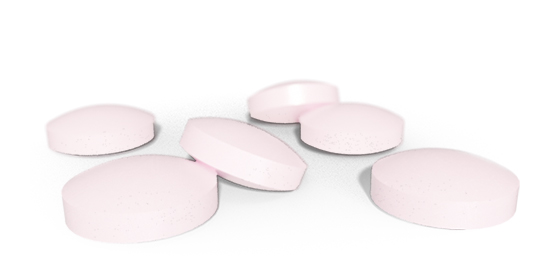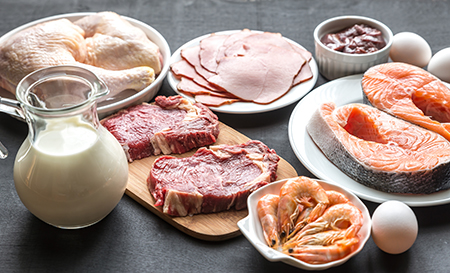Methylcobalamin - Active Vitamin B12
- Active B12
- High dose, tasty lozenges and chewable tablets
- Supports the nervous system's normal function
- Supports a normal formation of red blood cell
- Suitable for vegetarians and vegans
- Manufactured under Danish pharmaceutical control
BioActive B12
| 1 tablet contains | %RDA* | ||
|---|---|---|---|
| Vitamin B12 | 600 µg | 24000% |
* RDA = Recommended Daily Allowance
Produktfakta
Dosage:
1-2 lozenges daily for adults and children aged 11 years and older.
The recommended daily dose should not be exceeded.
Excessive consumption may have a laxative effect.
Dietary supplements should not replace a balanced diet and a healthy lifestyle.
Should only be used by pregnant women or children under the age of 11 years after consulting a physician or nurse practitioner
Contains sweetener.
Ingredients
Sweetener: Xylitol
Bulking agent: Maltodextrin
Flavor enhancer: Glycine
Anti-caking agent: Polyvinylpyrrolidon
Flavor: Peppermint powder
Anti-caking agent: Magnesium salts of fatty acids
Vitamin source: Methylcobalamin
Storage:
Room temperature. Not in direct sunlight.
Keep out of reach of children.
What is BioActive B12?
 BioActive B12 contains round, biconvex, pinkish lozenges with a diameter of 8.5 mm. The tablets have a pleasant taste of peppermint. Each tablet contains 600 micrograms of methylcobalamin which is vitamin B12 in its active form. The tablets can be sucked or chewed. When the tablets are sucked, they will predominantly be absorbed via the oral mucous membrane. The dosage is 1-2 tablets a day. The dosage is high in relation to the recommended daily allowance (RDA), but it is not associated with any risk of an overdose.
BioActive B12 contains round, biconvex, pinkish lozenges with a diameter of 8.5 mm. The tablets have a pleasant taste of peppermint. Each tablet contains 600 micrograms of methylcobalamin which is vitamin B12 in its active form. The tablets can be sucked or chewed. When the tablets are sucked, they will predominantly be absorbed via the oral mucous membrane. The dosage is 1-2 tablets a day. The dosage is high in relation to the recommended daily allowance (RDA), but it is not associated with any risk of an overdose.
Why active B12?
 Vitamin B12 in the form of cyanocobalamin and hydroxocobalamin are both converted in the body into one of the active B12 forms before they can be utilized. The body's ability to carry out this activation is normally weakened with age. It can also be compromised for other reasons. Since methylcobalamin (active B12) contains a methyl group that it needs to perform its functions, it is more effective than any of the non-active forms.
Vitamin B12 in the form of cyanocobalamin and hydroxocobalamin are both converted in the body into one of the active B12 forms before they can be utilized. The body's ability to carry out this activation is normally weakened with age. It can also be compromised for other reasons. Since methylcobalamin (active B12) contains a methyl group that it needs to perform its functions, it is more effective than any of the non-active forms.
Our stomach lining makes a protein called intrinsic factor that helps the intestines absorb vitamin B12. Older people may have poor B12 apsorption due to a lack of intrinsic factor. Chronic gastritis and gastrectomy (removal of part of the stomach) also causes an intrinsic factor deficiency.
It is not unusual for doctors to give vitamin B12 injections directly into a muscle. In this way you avoid problems like lack of intrinsic factor or impaired intestinal absorption for other reasons. Research has shown that high-dosed vitamin B12 in the form of lozenges is also absorbed effectively through the oral mucosa, thereby bypassing normal gastrointestinal uptake. Chewing the lozenges does not appear to reduce the absorption of vitamin B12
What is B12 vitamin?
Vitamin B12 is called cobalamin. It is named after the trace mineral cobalt, which is a part of the vitamin. Like the other B vitamins, vitamin B12 is water-soluble. B12 is absorbed into the blood from the small intestine but only if the vitamin has been encapsulated in a protective accessory protein called "intrinsic factor", which is produced in the stomach. After absorption, some of the B12 is deposited in the liver. Under normal conditions, the liver stores around 1-2 mg of vitamin B12. After vitamin B12 has been used, it is excreted into the bile, half of which is recycled. For that reason, a dietary B12 deficiency can take a long time to detect.
There are four versions of vitamin B12. Cyanocobalamin is the most common form used in dietary supplements. Hydroxocobalamin that is mainly produced by bacteria in the large intestine is also used for injection. Adenosylcobalamin and methylcobalamin can both be called the active forms of vitamin B12.
Effects of vitamin B12
Vitamin B12 supports the body's normal energy metabolism as it takes part in the citric acid cycle. This energy production helps to reduce fatigue and exhaustion. Vitamin B12 contributes to normal mental functions because it is involved in the body's serotonin production. Methylcobalamin is the only form of B12 that is directly engaged in the metabolism of homocysteine, where it helps transform homocysteine into methionine. Some of the methionine is used by the body to make S-adenosylmethionine (SAM) which is involved in the formation of various hormones and neurotransmitters that affect our mood. SAM is also required for cell growth, cell repair, and cell division. Vitamin B12 supports normal function of the nervous system by maintaining the myelin sheath that protects the axon of neurons and by protecting nerve cells and ensuring a rapid transmission of nerve impulses. Vitamin B12 contributes to normal immune function through its involvement in the formation of nucleic acids and proteins. Vitamin B12 contributes to normal formation of red blood cells. This is done via the hematopoietic stem cells in the bone marrow, which is where red blood cells are formed.
 Good sources of B12 in the diet
Good sources of B12 in the diet
Vitamin B12 is found almost exclusively in animal products. Vegetable foods that contain vitamin B12 have been fortified
- Liver
- Meat
- Fish / eggs / seafood
- Eggs
- Dairy products
- Cheese
Plants do not contain vitamin B12. Therefore, vegetarians and vegans should pay careful attention to getting enough B12. Also, older people and those with low stomach acid should make sure to enough B12.
Official claims
The European Food Safety Authority (EFSA) has evaluated the evidence behind vitamin B12 and has acknowledged the following claims:
-
Supports normal functioning of the immune system
-
Supports normal functioning of the nervous system
-
Has a role in the process of cell division
-
Contributes to normal red blood cell formation
-
Contributes to normal psychological functioning
-
Contributes to normal homocysteine metabolism
-
Contributes to normal energy-yielding metabolism
-
Contributes to the reduction of tiredness and fatigue
Related Products
 Bio-Multi supplements BioActive B12 with a basic supplement of vitamins and minerals, including the entire complex of B vitamins.
Bio-Multi supplements BioActive B12 with a basic supplement of vitamins and minerals, including the entire complex of B vitamins.
 Bio-B-Complex complements BioActive B12 with the whole complex of B vitamins in a strong dose.
Bio-B-Complex complements BioActive B12 with the whole complex of B vitamins in a strong dose.


